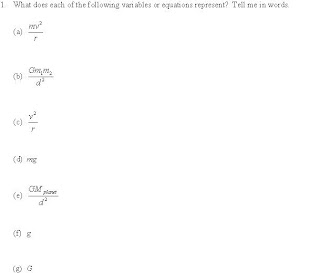 The word "gravity" is, by itself, utterly ambiguous. Nonetheless, our students will refer to a wide swatch of constants, principles, and equations by this single word. While that's not necessarily a problem in the context of a conversation with friends, the lack of specificity can get students confused and blown up when trying to solve test problems.
The word "gravity" is, by itself, utterly ambiguous. Nonetheless, our students will refer to a wide swatch of constants, principles, and equations by this single word. While that's not necessarily a problem in the context of a conversation with friends, the lack of specificity can get students confused and blown up when trying to solve test problems.To the right is part of a recent fundamentals quiz about "gravity." (You can click on it to read it at full size.) I listed every possible equation or constant that has any tenuous connection to "gravity," and I asked students to identify these items in words. Here's a summary of correct and (real) incorrect answers:
(a) Correct: Net force on an object in uniform circular motion, or just centripetal force.
Incorrect: centrifugal force, net force, centripetal acceleration, gravitational force
(b) Correct: Gravitational force exerted by any massive object on another, or just gravitational force.
Incorrect: Newton's law, gravitational field, g
(c) Correct: acceleration of an object in uniform circular motion, or just centripetal acceleration
Incorrect: centrifugal acceleration, acceleration, centripetal force, net force, gravitational acceleration
(d) Correct: Weight, force of a planet on an object on the planet's surface.
Incorrect: free-fall acceleration, mass
(e) Correct: Gravitational field produced by a planet, free-fall acceleration
Incorrect: Force of gravity, force of g, Newton's law, force of a planet, centripetal force
(f) Correct: Gravitational field, or free-fall acceleration
Incorrect: Force of gravity, gravity, weight, free-fall force, gravitational constant
(g) Correct: Universal gravitation constant
Incorrect: Newton's law, force of gravity, free-fall acceleration, gravitational field, gravity



That quiz seems to be more about the names of things than about the concepts themselves. I'd be more interested in whether the students could compute the height of a geosynchronous orbit on an arbitrary planet (given its mass and rotational period), than whether they remembered the right names for the concepts.
ReplyDeleteI've never been a big fan of vocabulary quizzes.
Well, of course -- but you can't compute the height of a geosynchronous orbit without knowing which equation is for force and which is for field. I should know, that very problem is the assignment I'm grading now.
ReplyDeleteI *am* a big fan of vocabulary quizzes. The students who do well on this quiz inevitably figure out the more complicated problem solving.
Can you teach Latin to someone who can't conjugate "amo," let alone tell you what it means? Physics learning begins, but DOES NOT END, with knowing fundamentals like these cold.
I agree. There needs to be a good understanding of the basic concepts which will enable them to solve complex problems.
DeleteI completely understand why you give this quiz.
ReplyDeleteIn fact, I think I'll be adding this to my Gravitation chapter review.
I was reading your older post (?) on the difference between Electric Field and Electric Force, and my students have the exact same issues. I'm trying to teach them to underline the word the question is asking for - field or force?